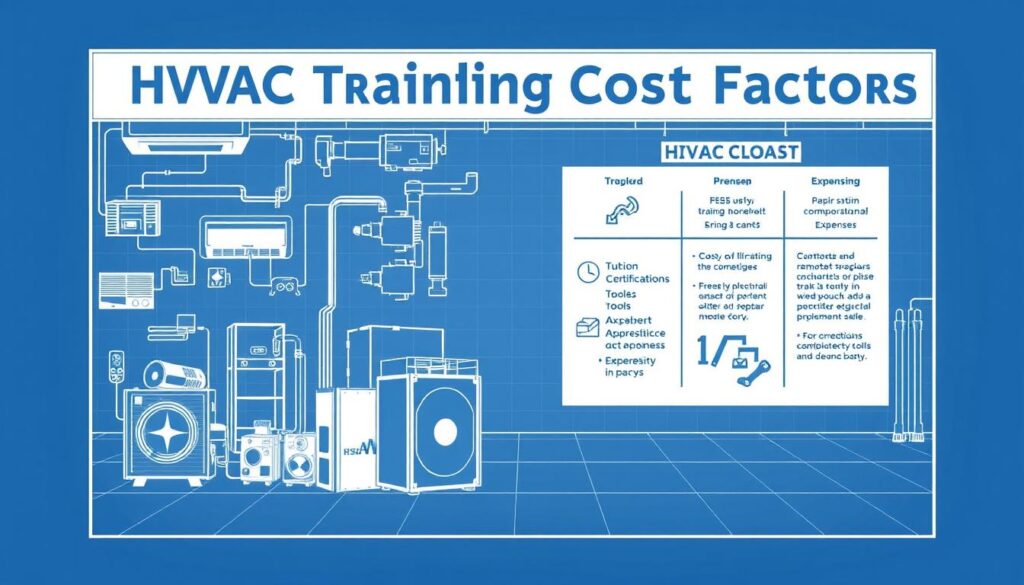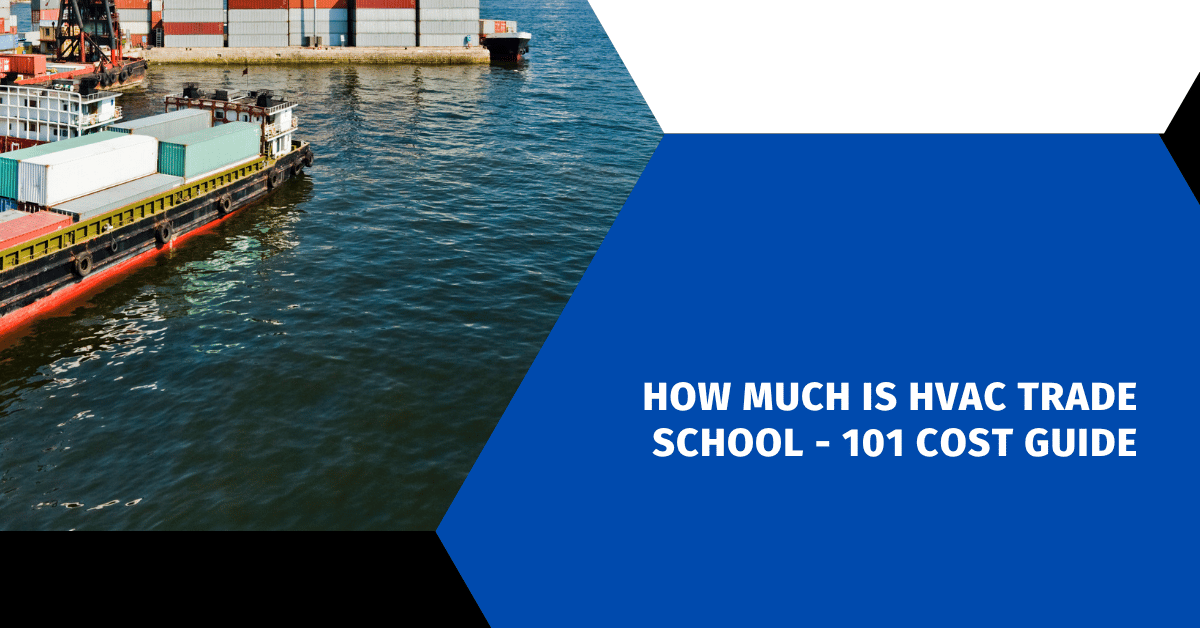Affiliate Disclosure
HVAC Guide Guys is a participant in the Amazon Services LLC Associates Program, an affiliate advertising program designed to provide a means for sites to earn advertising fees by advertising and linking to Amazon.
How Much Is HVAC Trade School? Thinking about HVAC training programs? They could lead to a stable and rewarding career. First, you need to know how much HVAC trade school costs.

Getting an HVAC education means planning your budget carefully. The cost of training changes based on several things. These include the type of program, how long it lasts, and where you study. You might spend on certificate courses or more on associate degrees.
This guide will walk you through the costs of HVAC trade school. We’ll look at tuition, financial aid, and how to choose the right training for you.
Key Takeaways
- HVAC trade school costs vary based on program type and location
- Multiple financial aid options exist for aspiring HVAC technicians
- Certificate and associate degree programs offer different investment levels
- Career opportunities can make up for the initial cost
- It’s important to research well before picking a program
Table of Contents
Understanding HVAC Trade School Education
Exploring hvac vocational schools is exciting for those interested in a technical career. The hvac technician education world offers many paths. These paths help you develop key skills and start a successful career in heating, ventilation, and air conditioning.
Choosing the right educational path is key for your HVAC future. Different programs meet various learning styles and career goals. This ensures you find the perfect fit for your professional dreams.
Types of HVAC Programs
HVAC vocational schools offer diverse educational chances:
- Trade and technical colleges
- Community college programs
- Apprenticeship training
- Online certification courses
- Manufacturer-sponsored training
- Trade union educational centers
Program Duration and Formats
Your hvac technician education can vary in length and structure. Typical programs last:
- Certificate programs: 6-12 months
- Associate degree tracks: 2 years
- Apprenticeship programs: 3-5 years
Core Curriculum Components
HVAC training covers essential skills like:
- Electrical systems
- Refrigeration principles
- System design and installation
- Troubleshooting techniques
- Safety protocols
Understanding these educational paths helps you make a smart choice for your HVAC career. You can pick a program that matches your professional goals.
Average HVAC School Tuition Costs
Understanding the cost of HVAC education is key for those starting their career. The price varies based on the program and how deep the training is.
Looking into HVAC certification costs, you’ll find different prices for different paths. Here are the typical costs you might see.
Certificate Program Expenses
Certificate programs are a fast way to start in HVAC with lower costs. Prices usually fall in these ranges:
- Short-term programs: $1,500 – $5,000
- Comprehensive certificate courses: $5,000 – $15,000
- Specialized certification training: $3,000 – $10,000
Associate Degree Program Costs
Associate degree programs offer deeper HVAC training at a higher cost:
| Program Type | Average Tuition | Duration |
|---|---|---|
| Community College Programs | $15,000 – $25,000 | 2 Years |
| Technical Institute Programs | $20,000 – $30,000 | 2 Years |
Additional Training Expenses
There are also extra costs to consider:
- Textbooks and study materials
- Tools and equipment
- Certification exam fees
- Safety gear and protective clothing
“Investing in your HVAC education is investing in your future career success.” – Industry Expert
Remember, hvac trade school tuition can change based on where you are and the school. Always look into financial aid to manage your hvac certification cost.
Explore Our HVAC Shop
Looking for top-rated HVAC tools, parts, and accessories? Visit our shop and find the perfect solution for your needs.
Visit the ShopHow Much Is HVAC Trade School: Complete Breakdown
Understanding the full financial landscape of hvac trade school is key for those planning their career. The cost of your HVAC education includes more than just tuition. It involves several other important parts.
Expenses for hvac career training fall into several main categories:
- Tuition Fees: Main educational costs range from $1,200 to $15,000
- Textbooks and Study Materials: $300 to $800 per program
- Specialized Tools and Equipment: $500 to $2,000
- Certification Exam Preparation: $100 to $500
Your investment will depend on a few key factors. Community colleges often have more affordable programs. On the other hand, specialized technical institutes might charge more. Think about the program’s reputation, length, and job prospects when looking at costs.
Different HVAC training paths have different costs:
- Certificate Programs: The shortest and most affordable option
- Associate Degree Programs: Offers more in-depth training but at a higher cost
- Apprenticeship Programs: A mix of education and paid work experience
Smart students look into various schools, compare prices, and check out financial aid. This helps them save money while aiming for a strong HVAC career.
Factors Affecting HVAC Training Costs
When looking at hvac technical colleges, it’s key to know what affects costs. Your choice in HVAC education has many parts that can change how much you pay. These parts are important for your education investment.

Exploring hvac education needs means looking at several important factors. These factors decide how much your training will cost:
- School Geographic Location
- Institutional Reputation
- Program Complexity
- Training Duration
- Equipment and Learning Resources
Impact of School Location and Reputation
The place of your school affects costs. Schools in big cities cost more because of higher living costs. But, schools with good reputations and strong connections might charge more. They offer better job help and networking.
Program Length and Specialization Considerations
The length and focus of your HVAC program affect costs. Programs that are longer or more specialized cost more. But, they give you deeper knowledge. Shorter programs are cheaper, but they might not offer as much.
Equipment and Learning Materials
Good HVAC training needs a lot of practical tools. Your costs will include special tools and hands-on training. These are key for learning the skills needed in the field.
Choosing your HVAC education wisely means finding a balance between cost and quality.
Explore Our HVAC Shop
Looking for top-rated HVAC tools, parts, and accessories? Visit our shop and find the perfect solution for your needs.
Visit the ShopHVAC Certification and Licensing Expenses
Starting a career in HVAC means facing different costs for certifications and licenses. These are key for growing your skills and showing you’re an expert. You’ll need to get several important certifications, each with its own price tag.
The main certifications for HVAC pros are:
- EPA 608 Certification
- NATE (North American Technician Excellence) Certification
- State-specific Licensing Credentials
Now, let’s look at the costs for each major certification:
| Certification | Approximate Cost | Key Details |
|---|---|---|
| EPA 608 Certification | $20-$150 | Covers different refrigerant handling types |
| NATE Certification | $130-$250 per exam | Core and specialty exams available |
| State Contractor’s License | $330-$500 | Varies by state, includes application and licensing fees |
Pro tip: Plan for more than one certification and possible retakes. Some states also need background checks or fingerprints, adding to your costs.
Remember, each certification is an investment in your career. While the initial costs might seem high, they lead to better jobs and higher pay in HVAC.
Financial Aid Options for HVAC Students
Getting into hvac training can be tough on your wallet. But, there are many ways to get help with the costs. Knowing about these options can make your education more affordable.

Understanding the financial side of technical education is key. You need to plan well and know where to find help.
Federal and State Grants
Federal grants are a big help for students in HVAC programs. Here are some important ones:
- Pell Grants for low-income students
- Federal Supplemental Educational Opportunity Grants (FSEOG)
- State-specific vocational training grants
Scholarship Opportunities
There are many scholarships to help cut down your costs:
- Industry association scholarships
- Technical school-specific awards
- Minority and diversity scholarships
Student Loan Programs
Student loans can help fund your HVAC education:
| Loan Type | Interest Rate | Repayment Terms |
|---|---|---|
| Federal Direct Subsidized Loans | 4.99% | Flexible income-based plans |
| Federal Direct Unsubsidized Loans | 6.54% | Standard 10-year repayment |
| Private Student Loans | 3.5% – 14% | Variable terms |
Looking into these financial aid options can change your HVAC training journey. It makes getting a professional education more possible without a huge financial load.
Explore Our HVAC Shop
Looking for top-rated HVAC tools, parts, and accessories? Visit our shop and find the perfect solution for your needs.
Visit the ShopComparing Different HVAC Training Paths
Choosing the right HVAC training path is key to your career. Each path has its own benefits for those starting in the HVAC field.
HVAC vocational schools offer a structured learning setting. They provide both hands-on and theoretical training. This is vital for growing in your career.
- Trade School Programs
- Structured curriculum
- Practical skill development
- Shorter completion time
- HVAC Apprenticeship Programs
- Earn while you learn
- Real-world work experience
- Mentorship opportunities
Community colleges also offer HVAC education. They have associate degree programs that mix theory and practice. These programs often have partnerships with local HVAC companies, helping you network.
Online learning is a flexible option for those with busy schedules. Virtual HVAC training can supplement traditional education, letting you learn at your own pace.
Successful HVAC professionals understand that continuous learning is key to career advancement.
Manufacturer-sponsored training and trade union programs offer specialized knowledge. They can also help you find a job. These paths often include extra certifications to enhance your skills.
Your best training path depends on your goals, learning style, and budget. Look at each option’s benefits and drawbacks to choose wisely for your HVAC career.
Return on Investment in HVAC Education
Investing in HVAC education can change your career for the better. Professional training in heating, ventilation, and air conditioning opens up great job opportunities. Knowing the financial benefits helps you choose the right career path.
Salary Potencial in HVAC Careers
The salary for HVAC workers depends on several things. Your income will likely increase with more experience and skills. Even new technicians can earn good money, with plenty of room to grow.
- Entry-level positions: $35,000 – $45,000 annually
- Mid-career technicians: $48,000 – $65,000 annually
- Experienced specialists: $65,000 – $85,000 annually
- Management and senior roles: $80,000 – $100,000+
Career Advancement Opportunities
Your HVAC education offers many ways to grow professionally. Skilled technicians can move into various roles, not just service jobs.
- Specialization Options
- Commercial HVAC systems
- Industrial refrigeration
- Green technology installations
- Management Positions
- Service team supervisor
- Operations manager
- Entrepreneurial Opportunities
- Starting your own HVAC business
- Consulting services
Investing in ongoing learning and skill improvement can boost your earnings and job satisfaction in HVAC.
Explore Our HVAC Shop
Looking for top-rated HVAC tools, parts, and accessories? Visit our shop and find the perfect solution for your needs.
Visit the ShopHidden Costs and Additional Expenses
When you’re planning your HVAC education, it’s important to know the whole cost. HVAC trade school tuition is just the start. Many students forget about extra costs that can really affect their budget.
Getting your HVAC certification isn’t just about classroom fees. You’ll also need to buy specialized tools and equipment. Here are some key costs you should expect:
- Professional tool sets ($500 – $1,500)
- Safety equipment and protective gear ($200 – $400)
- Certification exam fees ($50 – $300)
- Reference materials and textbooks ($100 – $250)
- Required software and digital resources ($100 – $300)
Some HVAC training programs require you to buy safety gear like safety glasses and steel-toed boots. These small costs can add up fast. You’ll also have to pay for professional memberships and ongoing education to keep your skills sharp.
Travel costs for hands-on training or certification exams can also be a big part of your budget. It’s wise to plan for these hidden costs early. This way, you can make a solid financial plan before starting your HVAC education.
Ways to Reduce HVAC School Expenses
Getting into hvac training programs can be tough on your wallet. But, there are smart ways to lower your costs. It’s key to find ways to save money without losing out on quality education.
Here are some effective ways to cut down on HVAC education costs:
- Research all financial aid options
- Look into community college HVAC programs
- Check for employer sponsorship
- Try online learning platforms
- Start saving money early
There are practical ways to save money on your education. Buying used textbooks or renting materials can save a lot. Many hvac programs offer flexible payment plans or scholarships to help with costs.
Work-study programs and part-time HVAC jobs are great for saving money. Some schools work with local businesses to let students earn while they learn. This makes your education more affordable and gives you real-world experience.
Pro tip: Always ask your hvac vocational schools about hidden discount opportunities, such as early registration incentives or complete financial packages.
By using these smart strategies, you can make your HVAC education more affordable. You won’t have to give up on quality training.
Conclusion
Figuring out the cost of HVAC trade school can be tough. But knowing the investment is key for your future. The prices for HVAC technician education vary from $1,500 to $30,000. This shows the wide range of training options available.
Choosing the right HVAC program is important. Look at the program length, what specializations they offer, and the return on investment. Each path has its own benefits, from certificate programs to associate degrees. Your dedication to learning will shape your success in the HVAC field.
Managing your HVAC trade school costs is essential. Look into scholarships, federal grants, and student loans to help pay for school. Quality training can lead to a stable, well-paying job in the growing HVAC sector.
Starting your HVAC technician education is more than just spending money. It’s a step towards a fulfilling technical career with high demand. By carefully choosing your path and understanding the value of specialized training, you’re setting yourself up for success.
FAQ
How much does HVAC trade school typically cost?
How much does HVAC trade school typically cost?
FAQ
How much does HVAC trade school typically cost?
HVAC trade school costs vary. Certificate programs cost between
FAQ
How much does HVAC trade school typically cost?
HVAC trade school costs vary. Certificate programs cost between $1,200 and $5,000. Associate degree programs can cost from $5,000 to $15,000. The cost depends on the school, program length, and location.
What financial aid options are available for HVAC students?
HVAC students have many financial aid options. You can get federal and state grants, scholarships, and loans. Schools also offer payment plans and tuition assistance to help with costs.
How long does HVAC training typically take?
HVAC training times vary. Certificate programs last 6-12 months. Associate degree programs take 2 years. Apprenticeships last 3-5 years, combining classroom and on-the-job training.
What additional expenses should I budget for beyond tuition?
You’ll need to budget for textbooks, tools, and personal protective equipment. You’ll also need to pay for certification exam fees and travel. These costs can range from $500 to $2,000.
Are online HVAC programs cheaper than in-person training?
Online HVAC programs might be a bit cheaper. They save on transportation and some materials. But, you’ll need hands-on training, so the cost difference is small. Some programs offer a mix of online and in-person training.
What certifications do I need to become an HVAC technician?
You’ll need the EPA 608 Certification for refrigerants. You might also want NATE (North American Technician Excellence) certification. Certification costs are $50 to $300, depending on the credential.
Can I work while attending HVAC trade school?
Yes, many HVAC programs are flexible. They offer evening, weekend, and part-time classes. Some schools have work-study programs or apprenticeships to help you earn while you learn.
What is the average salary for an HVAC technician?
HVAC technicians earn $45,000 to $75,000 a year. This depends on experience, location, and specialization. HVAC training offers a good return on investment.
Are there ways to reduce HVAC school expenses?
Yes, you can reduce costs by applying for scholarships and using financial aid. Buying used textbooks and exploring accelerated programs can also help. Some employers offer tuition reimbursement for HVAC training.
What career opportunities are available after completing HVAC training?
HVAC training opens many doors. You can work as a residential or commercial technician, or in maintenance. You can also work in sales, design, or start your own HVAC business. Specializing in areas like solar technology or commercial refrigeration can expand your opportunities.
,200 and ,000. Associate degree programs can cost from ,000 to ,000. The cost depends on the school, program length, and location.
What financial aid options are available for HVAC students?
HVAC students have many financial aid options. You can get federal and state grants, scholarships, and loans. Schools also offer payment plans and tuition assistance to help with costs.
How long does HVAC training typically take?
HVAC training times vary. Certificate programs last 6-12 months. Associate degree programs take 2 years. Apprenticeships last 3-5 years, combining classroom and on-the-job training.
What additional expenses should I budget for beyond tuition?
You’ll need to budget for textbooks, tools, and personal protective equipment. You’ll also need to pay for certification exam fees and travel. These costs can range from 0 to ,000.
Are online HVAC programs cheaper than in-person training?
Online HVAC programs might be a bit cheaper. They save on transportation and some materials. But, you’ll need hands-on training, so the cost difference is small. Some programs offer a mix of online and in-person training.
What certifications do I need to become an HVAC technician?
You’ll need the EPA 608 Certification for refrigerants. You might also want NATE (North American Technician Excellence) certification. Certification costs are to 0, depending on the credential.
Can I work while attending HVAC trade school?
Yes, many HVAC programs are flexible. They offer evening, weekend, and part-time classes. Some schools have work-study programs or apprenticeships to help you earn while you learn.
What is the average salary for an HVAC technician?
HVAC technicians earn ,000 to ,000 a year. This depends on experience, location, and specialization. HVAC training offers a good return on investment.
Are there ways to reduce HVAC school expenses?
Yes, you can reduce costs by applying for scholarships and using financial aid. Buying used textbooks and exploring accelerated programs can also help. Some employers offer tuition reimbursement for HVAC training.
What career opportunities are available after completing HVAC training?
HVAC training opens many doors. You can work as a residential or commercial technician, or in maintenance. You can also work in sales, design, or start your own HVAC business. Specializing in areas like solar technology or commercial refrigeration can expand your opportunities.

